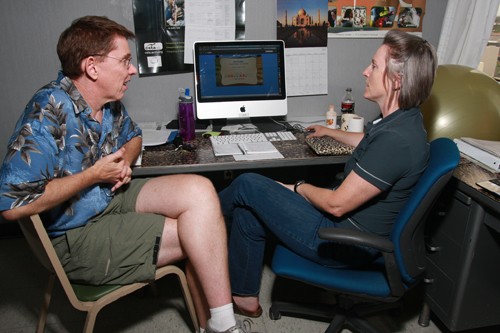A group of UA scientists was recently awarded $1.4 million by the Defense Advanced Research Projects Agency to launch Teach Ourselves, a project that provides students a web-based learning environment through Facebook.
Carole Beal, co-principal investigator on the grant and professor of cognitive science, said it will be an intellectual space where students can contribute.
“”Students don’t always get the opportunity to be as creative as this program would allow,”” Beal said.
Jane Strohm, an education informatics researcher from the UA Department of Computer Science, is a contributor to the project and said that it is still in the concept phase. Strohm said Facebook already has tools in place that project researchers can use, including Facebook groups and applications, but they will be evaluating which one will work best.
The essence of Teach Ourselves is to provide an area where students can demonstrate their knowledge by showing others what and how they learned something.
“”We’re hoping that high school students could create materials that could help middle school students or university students could help high school students prepare for college level work,”” Beal said.
The sky is the limit in terms of materials, Beal said.
Posting a video, scanning a solution, making a PowerPoint presentation or tablet are all viable options for students to show a step-by-step process in their understanding of a concept, she said.
Anthropology junior Max Silva thinks the project would have been helpful to her and that learning takes practice.
“”It would help a lot, so you could follow the steps,”” Silva said.
Chemistry sophomore Harry Manny said he has no doubt he would have participated in this program, had it been offered to him during his middle and high school years.
“”I think with everything they’re having us do at this point, I’m going to need all the help I can get. The amount of work they’re having us do in all of the sciences … if there is anything they can do to offer more supplemental instruction, even if it comes from my peers, I would definitely use something like that. I wouldn’t think twice,”” Manny said.
Other students said they didn’t think the program sounds appealing.
Anthropology sophomore Evelyn Pickering feels the program would have been useful to her, but without a reward or the requirement to do it, she might not participate.
“”I am terrible at math, so it would have been helpful. But if it’s not required, I’d never do it,”” she said.
Pickering thinks that gift certificates or awards would be good incentives.
“”If a student is creating a lot of materials, demonstrating proficiency in something, maybe we could offer that student something, a possible certificate, gift card or internship. We don’t know how that will play out yet. Maybe we can formalize this so a student can eventually get a university credit this way. To keep it going long-term, I do think we need a more formal incentive,”” Beal said.
According to Strohm, in order to successfully launch the project, they must have a minimum of one participating student in 15 different states, which are yet to be determined, within a year. Strohm that they are hoping to do a local pilot program for a few months in the early part of 2011, continuing to gain supervised utilization and branch out to those 15 states.
“”We’re kind of working backwards from that goal. We know that we have to get to those 15 states by the end of this first year, which is phase one. We are kind of noting milestones to make that possible,”” Strohm said.
Strohm said Teach Ourselves will allow students to engage in websites that already exist and from there they can create their own content. She said that in the same way a student can easily post a YouTube video, they can also generate an explanatory video on photosynthesis and how it works.
“”What excites me is that it is using the social media that has really engaged the generation that we’re trying to target, the instantaneous construction of content, and the possibility to earn real stuff that’s actually valuable to continue your education,”” Strohm said.
UA students will have the opportunity to mentor and review content for students participating.
“”We’re building up our list of mentors … people who work in the industry, teachers who run after school programs who would be interested, and university students,”” Beal said.
Beal said mentors would drop in and check on how students got their answers, looking for evidence of learning and understanding.
“”People think they really understand until they have to explain it to someone else,”” Beal said.
Visit www.teachourselves.org for more information.









